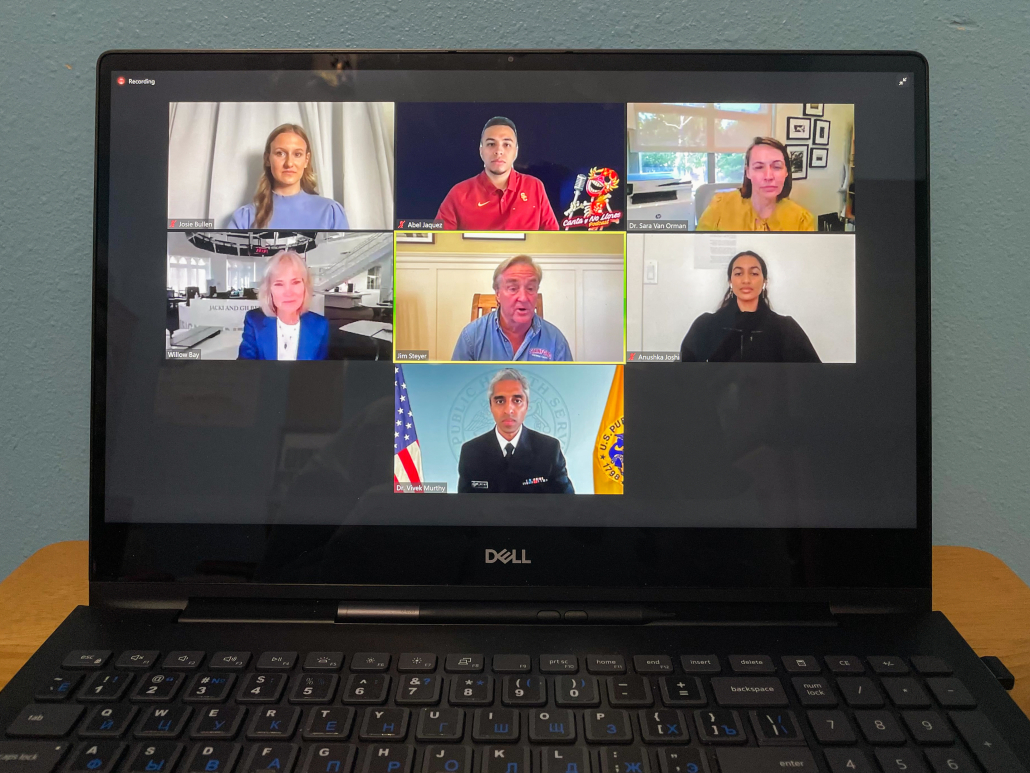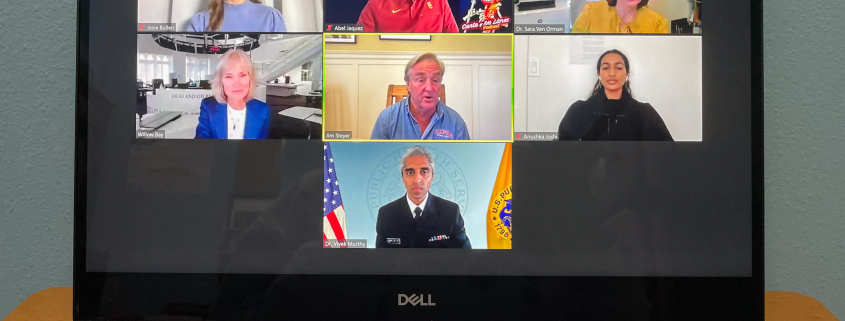Annenberg hosts discussion on mental health, social media during the pandemic

More than a year into the coronavirus pandemic, mental health has been a major topic of concern across disciplines. Focused on its intersection with social media, Annenberg School of Communication and Journalism Dean Willow Bay talked with United States Surgeon General Dr. Vivek Murthy and Common Sense Media CEO Jim Steyer in a conversation about how young adults manage mental health Thursday.
Bay started by sharing a video on the report “Coping with COVID-19: How Young People Use Digital Media to Manage Their Mental Health,” conducted by Susannah Fox and Steyer. The report, published in March, details how the coronavirus pandemic has affected the mental health of young adults and how digital media has helped combat the negative mental health effects of the pandemic. According to the study, nearly 40% of all young adults aged 14 to 24 felt some sort of depression during the past year.
USC Chief Health Officer Dr. Sarah Van Orman said many young adults, especially college students, were grappling with anxiety and depression before the pandemic, with those numbers increasing significantly since last March. In addition to an increase in mental health crises, Van Orman has also observed a decrease in a sense of belonging among students.
To combat the detrimental effects of the pandemic on their mental health, many young adults turned to digital resources and social media to remain connected to others, access critical health information and receive comfort in stressful times, according to Fox and Steyer’s report.
“What the research showed is that most young people now turn to social media for connection, for finding relationships,” Steyer said. “We’ve all been stuck on Zoom screens and locked in our houses, so it’s been incredibly important for young people and for all of us to have the connectivity that the web provides, the internet provides [and] that social media provides.”
Young adults have even used the internet to seek mental health resources like online therapy and counseling during the pandemic, the report said. The use of telehealth resources has set a new standard for online health resources going forward, according to Van Orman. She sees numerous benefits to online health systems, such as increased students seeking care.
“We saw for the first time ever that our health visits surged over the end of semester between December and January,” Van Orman said. “That’s the time normally where students have a disruption in care, whereas this year, we actually saw students continuing care.”
Following the conversation about online health services, Steyer explained how the pandemic exposed the “extraordinary inequality” in America. Steyer’s report showed that lower-income communities and communities of color had the highest rates of the coronavirus. In turn, these communities also experienced higher rates of mental health issues such as depression and anxiety.
Van Orman confirmed Steyer’s findings with data from USC. Van Orman reported that African American and Latinx students were twice as likely to have experienced a personal loss of someone in their family who had been impacted by the coronavirus. She also stated that approximately 25% of USC students reported that the pandemic directly impacted their ability to meet their financial obligations.
Bay introduced Murthy around 30 minutes into the call, highlighting his focus on the mental health of young Americans over the course of the pandemic.
Murthy started with an apology for his late arrival and said he had been speaking with President Joe Biden immediately prior. He then addressed the events’ participants, saying that the issues surrounding mental health affected more than just those with a diagnosis.
“Not everyone always thinks about themselves as having serious mental illness even though many of us, if not all of us, struggle at points with our mental health and our emotional well being,” Murthy said. “The truth is we exist on a spectrum.”
Murthy said that the future of mental health cannot change unless the culture around it changes and addressed the students in attendance as the agent of that change. When asked about how people will cope post-pandemic, he said the answer lies in communities.
“We need each other for our health, for our success and for our happiness,” Murthy said. “For people who were engaged in the busy work of a busy world — going to work, going to school, writing papers, applying for jobs, buffing your resume, doing all the things you’re told to do as you were growing up — I think this pandemic really [grounded] our world to a halt. It’s separated us from one another.”
Murthy said he has echoed this sentiment about the importance of connection and mental health in conversations with the president over the last year.
“[Biden] knows how critical and essential mental health is,” Murthy said.
In an attempt to normalize seeking help, Murthy promoted the idea of therapy as a helpful tool to address mental health.
“People don’t really understand what therapy is,” Murthy said. “One of the things we have to do to destigmatize treatment is actually to have people talk about their experiences with treatment more.”
Murthy said that the additional time and resources spent on social media over the course of the pandemic helped build a sense of community but carries a potential for harm to mental health as well.
“The experience of passively surfing your feed is the experience of comparing your average days to other people’s best days,” Murthy said. “It can evolve over time, and we can find ourselves trying to be somebody that we’re not or trying to fulfill other people’s expectations rather than showing off as ourselves.”
Murthy said the best way to remedy the adverse effects of social media was total honesty from its users, but the onus of responsibility ultimately rested with platform developers.
When asked about addressing the increase in mental health concerns, Murthy emphasized the impact of local connections.
“I actually think the solutions will be very local; I think that people have to have and start these conversations in their communities, whether it’s on a college campus, or whether it’s in a workplace or whether it’s within your extended family or your circle of friends,” Murthy said. “When [people] have authentic, genuine conversations with each other, that’s a very powerful ingredient for connection.”

